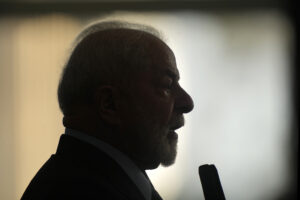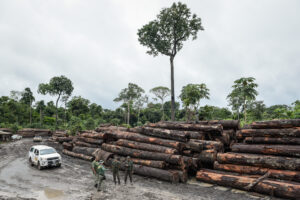Brazil’s Recession Grows as Emissions Rise
The country is the only major one in the world where damage to the climate is worsening as the population becomes poorer. Officers from Brazil's Institute of the Environment and Renewable Natural Resources finding felled trees in northern Brazil. (IBAMA / Wikimedia Commons)
Officers from Brazil's Institute of the Environment and Renewable Natural Resources finding felled trees in northern Brazil. (IBAMA / Wikimedia Commons)
SANTAREM, Brazil, 14 November, 2017 – Brazil’s recession has earned it an unhappy distinction: it is the only major country in the world where damage to the climate is growing while people are becoming poorer.
In 2016 Brazil’s total greenhouse gas emissions rose by almost 9%, reaching their highest level since 2008. This makes it the only large economy in the world whose emissions are growing while living standards for most of its population, far from rising, have fallen. The main causes of the rise in emissions are deforestation and farming practices.
The System for Greenhouse Gas Emissions and Removals Estimates, SEEG, part of Brazil’s Climate Observatory, produces annual estimates of the country’s greenhouse gas emissions. It says they rose from just over two billion tons of CO2 equivalent in 2015, to nearly 2.3bn tons in 2016.
This means the total has already, five years early, reached the 2020 target for Brazil decided under the Paris Agreement, showing that only drastic measures will bring emissions down again. If the economy recovers, as the government hopes it will over the next few years, the task will be even more difficult.
Yet the government remains upbeat. In his speech to the UN Assembly in September, President Michel Temer claimed that new data showed a drop of over 20% in deforestation in the Amazon in the period from September 2016 to July 2017 (a claim later reduced to 16%), saying: “We have rejoined the right road and we will persist on this road.”
Environment minister José Sarney Filho spoke of the “tendency being reversed”, but environmentalists remain sceptical. One said the real reversal of the tendency was the increase of deforestation in 2015 and 2016, after the reduction seen between 2005 and 2012.
The biggest cause of the rise in emissions was agriculture, which accounted for 74% of Brazil’s emissions in 2016. Of this total, 51% was due to what is euphemistically called “change in land use” – deforestation.
Changing appetites
A 23% growth in the use of nitrogen fertilisers, which produce nitrous oxide, has also worsened the problem, as has the fall in beef consumption, caused by consumers turning to cheaper meats like pork and chicken.
Paradoxically, this has meant greater numbers of cattle grazing and producing methane, as fewer are sent to the slaughterhouse. Brazil has the largest herd in the world, with 198 million head of cattle.
While the total of emissions from farming and deforestation rose, during the same period almost all other sectors of the economy saw theirs falling. The energy sector dropped by over 7%, because of lower demand and the growing contribution of renewables.
Ane Alencar, the researcher responsible for the SEEG calculations, who works at IPAM, the Institute for Environmental Research in the Amazon (Portuguese only), said: “Uncontrolled deforestation, especially in the Amazon, has led to the emission of 218 million tons more CO2 in 2016 than in 2015. That’s twice what Belgium emits in a year.” She said most of this deforestation was illegal, contributing nothing to Brazil’s GDP.
Budget halved
The government of President Temer is caught between the need to fulfil Brazil’s international obligations and the demands of the influential rural lobby, who want more deforestation, not less, and less enforcement, not more.
The reduction achieved in the last few months was won in spite of government policy, not because of it. As part of the government’s austerity programme, Temer had actually halved the budget of the environment ministry in 2016, leading to a drastic fall in its ability to stop illegal deforestation and protect conservation efforts.
But a grant from the Amazon Fund, set up by Norway in 2008 to save the rainforest, with contributions from Germany and the Brazilian state oil company, Petrobras, has enabled Ibama (the Institute of the Environment and Renewable Natural Resources, the environment enforcement agency – Portuguese only) to re-equip its posts in the Amazon region and hire more staff.
Yet enforcing environment laws in Brazil is never straightforward. A few days ago there was a dramatic illustration of the problems faced by Ibama after it destroyed the dredgers being used illegally to find gold on the bed of the Madeira river, a large Amazon tributary.
General amnesty
An angry crowd of gold miners, deprived of their livelihood, attacked the agency’s offices in the nearby town of Humaitá and set them on fire, after looting hundreds of confiscated electric saws. All the agency’s vehicles, and a boat on the river used for its work, were torched.
In Brasilia, pressure against the country’s environmental laws is more sophisticated. In the national congress the powerful farmers’ lobby has just pushed through Law No. 13465, which will amnesty everyone who illegally invaded public lands, including parks and conservation areas, between 2004 and 2011.
Ignoring protests that the new law, dubbed “the landgrabbers’ charter”, will encourage new invasions, signaling that crime pays, President Temer has sanctioned the law. He needs the farmers’ votes for his own political survival.
Your support matters…Independent journalism is under threat and overshadowed by heavily funded mainstream media.
You can help level the playing field. Become a member.
Your tax-deductible contribution keeps us digging beneath the headlines to give you thought-provoking, investigative reporting and analysis that unearths what's really happening- without compromise.
Give today to support our courageous, independent journalists.






You need to be a supporter to comment.
There are currently no responses to this article.
Be the first to respond.